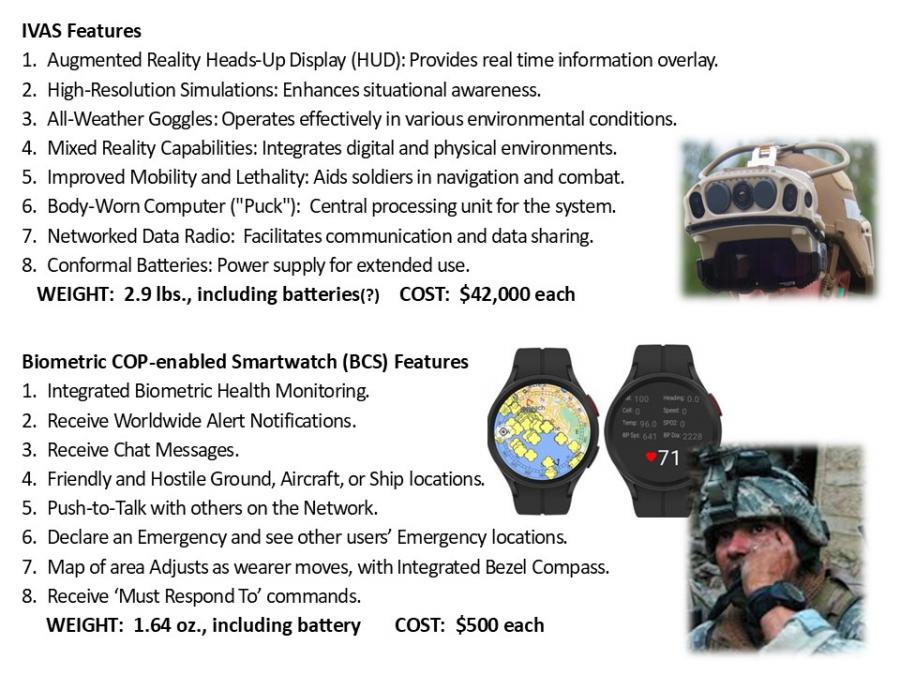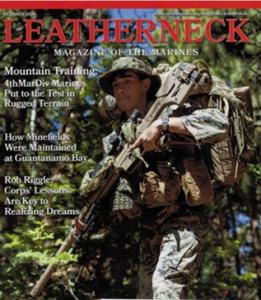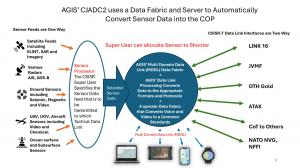
Innovative Situational Awareness Use for Biometric Smartwatch
IVAS vs Biometric COP enabled Smartwatch
JUPITER, FL, UNITED STATES, October 6, 2024 /EINPresswire.com/ -- .
The Integrated Visual Augmentation System (IVAS) had been developed to provide soldiers with enhanced situational awareness and combat capabilities by integrating next-generation technologies into a single wearable device. The goal was to create a versatile system that could be used for fighting, rehearsing, and training, combining augmented reality, high-resolution simulations, and mixed reality features.
LINK: https://en.wikipedia.org/wiki/Integrated_Visual_Augmentation_System
The IVAS 1.2 variant has been in an advanced stage of development, having prototypes delivered and final rounds of testing having been scheduled for 2024. The IVAS 1.2, intended to replace the helmet Enhanced Night Vision Google-Binocular, would also provide the soldier/user with a Common Operational Picture (COP).
For some applications, IVAS 1.2 systems are costly, heavy, and add significant weight to an already overburdened soldier/Marine, that may decrease his/her operational effectiveness. This is true for infantry operations where personnel already are overloaded. For operations that are behind enemy lines for a significant time period, this is especially true.
There however exists an innovative use of a Biometric COP enabled Smartwatch (BCS), which when employed with the Enhanced Night Vision Binocular, has more capabilities than IVAS 1.2 in some areas and less in others, at a fraction of the cost.
How is this done?
Understanding that assured communications is a critical need, the software engineers at Advanced Ground Information Systems (AGIS) have taken their agile C5ISR system and applied key functional features into the design of the new BCS. As a result, the innovative BCS offers a number of operational capabilities that are not available with the latest IVAS 1.2.
The innovative BCS receives data from a combination of AGIS’ Data Fabric and Server. The AGIS’ Data Fabric receives data from Link-16, JVMF, OTH Gold, CoT and NATO ADEM, NVG and NFFI data links, from a USAF feed of Satellite locations, along with data from one or more of the various 25 types of sensors that can be sent to the Server (i.e. magnetic detection of vehicles). The AGIS Data Fabric converts this data link information, voice, and commands into a superset data link called Multi Domain Data Link (MDDL), that is sent to the AGIS Server for transmission to the BCS devices thus providing them the ability to display the Air, Ground, Sea, Space COP on a map and, most importantly, the locations of friendly and hostile units near them. MDDL also enables the BCS to communicate with others by sending the data to the AGIS Server which relays the data to other Laptop PCs, Androids, iPhones and BCSs that are on the same network.
The BCS is an integrated computer, GPS, Color display, and watch. The MDDL data link provides the information to the BCS computer to provide the COP display. Additionally, it supports Voice PTT, Chat and Emergency declarations with others on network and transmits the wearers’ biometric data which alerts others if the wearer is injured.
The BCS software selectively displays an integrated compass that is visible around the watch’s bezel and is superimposed on a georeferenced map. While it is envisioned that the BCS wearers will principally be interested in their own map location and status of fellow Squad members, BCS can be zoomed out to give an expanded look at large areas and is capable of displaying up to 4,000 MIL STD 2525 symbols.
The BCS transmits its biometric data to the AGIS Server, which forwards the data to AGIS Smartphones, PCs and BCSs. This includes:
- Blood Pressure Data: Systolic and Diastolic.
- Heart Rate: Continuous heart rate, with resting heart rate and heart rate variability.
- Body (Wrist) Temperature.
- Electrocardiogram (ECG): Helps detect irregular heart rhythms.
- Pulse Oximetry: Measurement of blood oxygen saturation levels.
- Respiration Rate: Tracking of breathing rate throughout the day and night.
- Hydration Tracking: Monitoring of daily water intake.
Part of the innovative features is that the MDDL software enables the BCS to communicate with other devices using Cellular, Wi-Fi, Satellite, Radio or any combination of these communication methods.
Even when the BCS app is not turned on, the BCS can receive worldwide FCM (Firebase Cloud Messaging) Alerts (for such things as missile attacks, "Hostile attack at…", etc.). If the BCS is not turned on, an alert will immediately appear once the Smartwatch is powered on.
BCS data can also be sent to ATAK using CoT and, because it uses a Samsung Smartwatch, the government customer will have a common supplier interface as the USMC and Army ATAK operates on Samsung Smartphones and Tablets.
Personnel Training
IVAS 1.2 and the BCS have taken very different approaches to training
IVAS 1.2 enables tactical planning, networked information sharing, and an augmented reality Synthetic Training Environment (STE) that enables Warfighters to fight “bloodless battles” before engaging the enemy.
The new innovative approach with the BCS, on the other hand, enables collection of vital health statics during military exercises. When soldiers/Marines, who are wearing BCD devices, are in their military training exercises, their body activities/ movement and vital health statics are collected and transmitted to the BCS Laptop/ Server using the BCS’ integrated cellular communications. The Server stores the identity, location, time, and the biometric data in real time for those wearing a BCS, thus permitting the observation of the training exercise on a COP and the vital health data of those involved. Since the server records the data, it can be summated and used as one of the criteria for the readiness of the unit being trained to perform its mission.
ABOUT AGIS: The key personnel at Advanced Ground Information Systems, Inc. (AGIS) have worked together for many years creating military communications systems that provided data interoperability between dissimilar systems. The result is a system based on Lego type modules, enabling rapid reconfiguration to meet different requirements. The AGIS LifeRing software provides a multi-service, multinational COP to interfacing systems. AGIS, Inc., has 23 US Patents with additional Patents pending.
Malcolm K. Beyer, Jr.
Advanced Ground Information Systems (AGIS), Inc.
+1 561-744-3213
beyerm@agisinc.com
AGIS Biometric Smartwatch as IVAS alternative
Distribution channels: Aviation & Aerospace Industry, Military Industry, Science, Technology, World & Regional
Legal Disclaimer:
EIN Presswire provides this news content "as is" without warranty of any kind. We do not accept any responsibility or liability for the accuracy, content, images, videos, licenses, completeness, legality, or reliability of the information contained in this article. If you have any complaints or copyright issues related to this article, kindly contact the author above.
Submit your press release


